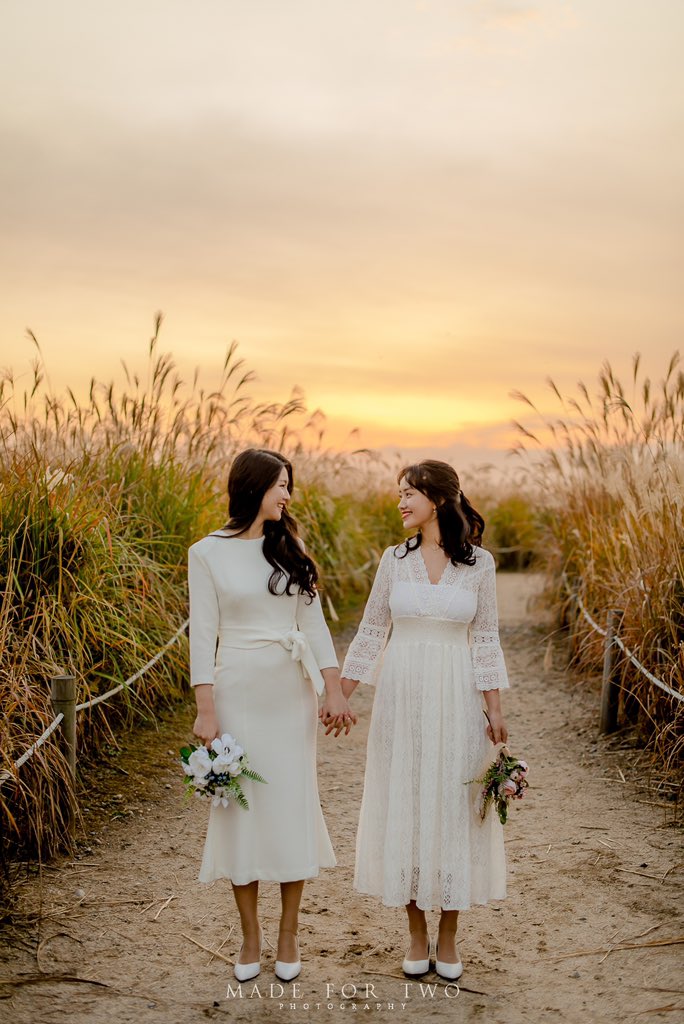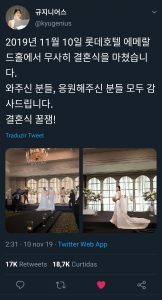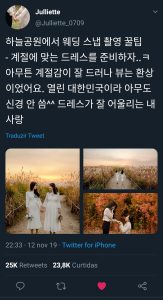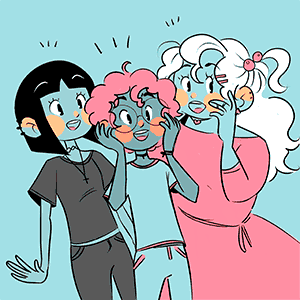They talked to K4US about making their union official in a country where LGBTQ+ marriage isn’t legal.
In the past few weeks we saw two lesbian couples go viral with their wedding ceremony and photoshoot pictures. Not only the fact that they were adorable reached an audience of over 20K people, but the fact that both couples are from a country that doesn’t recognize same-sex marriage: South Korea.
- For the second time, Kyujin and her wife went viral. This time because of their wedding ceremony
- In the very same week, our interviewees took over Twitter with their wedding photoshoot
Even before hitting the news – with a surprising headline saying “The concept of ‘family’ in our society is changing little by little” – one of the couples was already known by their history, which indicates a possible progress amongst a society notorious by its bid to tradition and conservative behavior. That is because when one of the brides applied for honeymoon holiday and congratulatory money (which is usually given to straight couples), her request was granted with no occurrence of prejudice. And this history repeated itself with the couple interviewed by us to the third part in our Korea LGBTQ+ series.
+ read the series’ first and second interviews here
Going by the “J” and “D” initials, our couple met for the first time a bit over a year ago, and now, at the age of 23 and 24 respectively, they decided to move to the next stage of their relationship. The wedding is set to be held on February of 2020 but the preparations are already on going and they shared a bit about the experiences around this new moment they’re living – as well as the political moment LGBTQ+ community is facing in Korea.
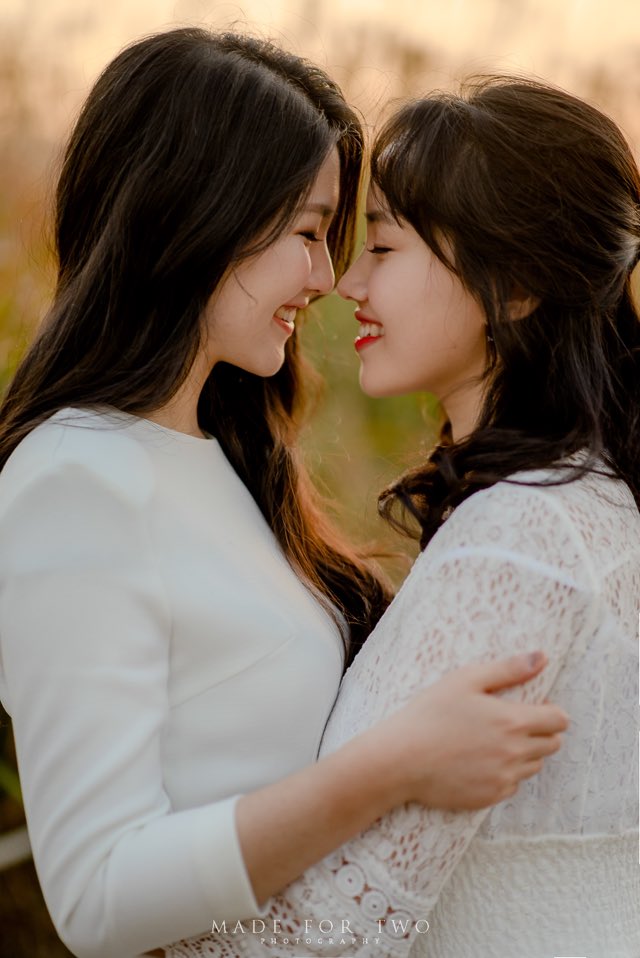
Marriage has a whole heterosexual historical background, which leads a lot of LGBTQ+ couple to skip the tradition and directly move in together. What made up your mind to decide on marriage?
J: There’s nothing special about making a marriage decision. Just as many hetero couples choose the path of marriage, when they get a confidence in each other, so have we.
How long were you together when you decided to officialize your union and how was the proposal?
J: It’s been a little over a year since we met. After my wife’s company confirmed that her marriage benefits would be the same as it is for a heterosexual couple, she began to prepare for marriage. After a while I got a proposal at the hotel. It was very common to others but it was a very romantic proposal for me.
Marrying the woman you love in a society that doesn’t accept your relationship is an act of courage. Was it difficult for you to assimilate the idea of marriage as the next step for the two of you?
D: No. From the beginning, we had a firm idea of marriage. We thought we should do it if we get a chance.
According to your twitter bio, you’re getting married next year, right? How has the process been? Will you have to go to another country?
J: In Korea, we cannot register our marriage because same-sex marriage is not legalized yet. Instead, like the heteros, we decided to have an ordinary wedding.
D: But if the time permits, I’m planning to file a marriage declaration in another country.
J: I’ve been really busy getting ready to get married. Not long ago, I completed a date snap with the help of a photographer. Now I need to pick my wedding dress and [there’s] one more shot left for my wedding album. Just have a busy day. We are really looking forward to it.
What are your expectations about that coming day? Will you have friends and family around you?
J: I invited my friends and coworkers to the wedding. I don’t realize it yet, but I’m worried about crying.
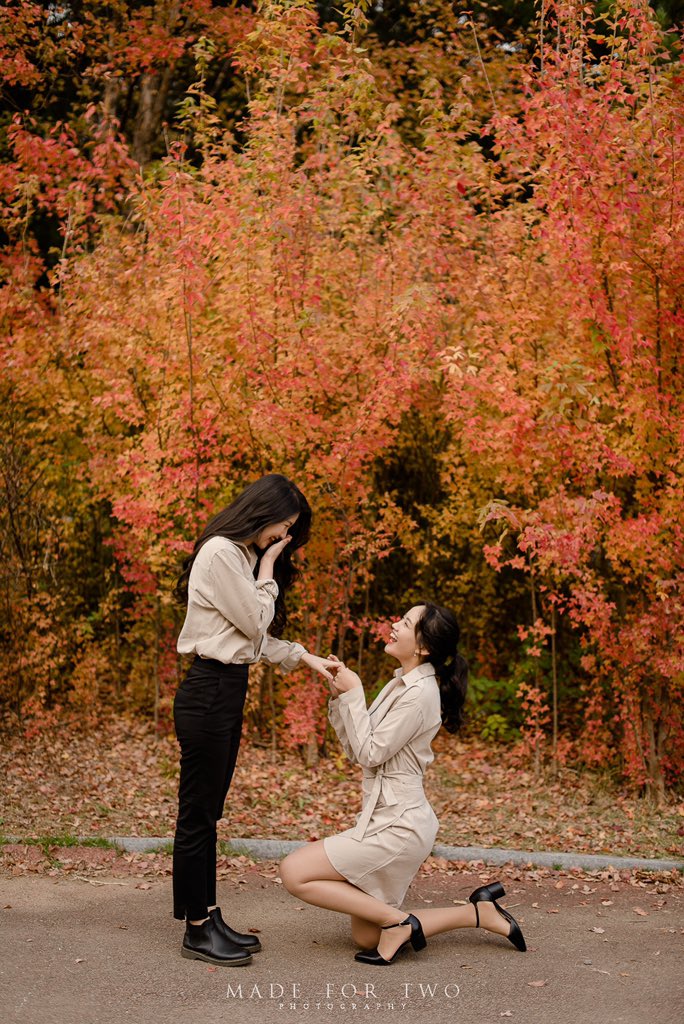
You said that your wife’s company reassured her the same marriage benefits that straight people also gets. Do you think this [same-gender relationships] is something that is becoming more natural? Are companies and people, specially the younger generations, opening their minds about it?
J: Public perceptions are increasingly changing. The way of thingking – which is flexibly expanded – of young people naturally accepts it, and once that atmosphere is created, there must be a perception that ‘Discrimination is bad’. Maybe that’s the reason why my wife’s company also decided to give her the same welfare for the marriage.
In the old days, there was no information and exposure of homosexuals, so people acted as fearful and even unreal when they first think about homosexuality. But as soon as their stories are heard often, [people are] exposed directly or indirectly, and naturally feel that they really exist, then realize that they are no different. That’s why I open my married life to SNS.
Indeed, because many Koreans are increasingly aware of homosexuality, I believe that the issue of legalization of same-sex marriage will be positively resolved as soon as possible.
Your wedding pictures are the second from a lesbian couple to go viral last week (along with Kyujin and wife’s pictures). How do you feel about it? Did you get a lot of support?
J: I was a little surprised at [getting] more attention than I thought, but thanks for the support that many people gave me. I was really impressed. And I would like someone to see the picture and get courage.
Considering this, do you know a lot of married Korean LGBTQ+ couples?
J: Until recently, the existence of lesbians in Korea has been barely revealed, but in recent years, I have been watching them get married and live together through YouTube and other media. I think it’s gonna happen more in the future.
Not every Korean couple can go abroad to officilize their union. Is there any law project and discussion on making same-gender marriage legal in Korea?
D: In Korea, there is a website where the government and the public can talk about the agenda, and there has been a continuous petition for legalizing same-sex marriage.
In the past, many lesbians lived in hiding, but the people coming out are constantly exposed to the media and their presence is becoming increasingly apparent. Broadcasting and various YouTubers also started to deal with that topic a lot. But most lawmakers and middle-aged people are very opposed to it.
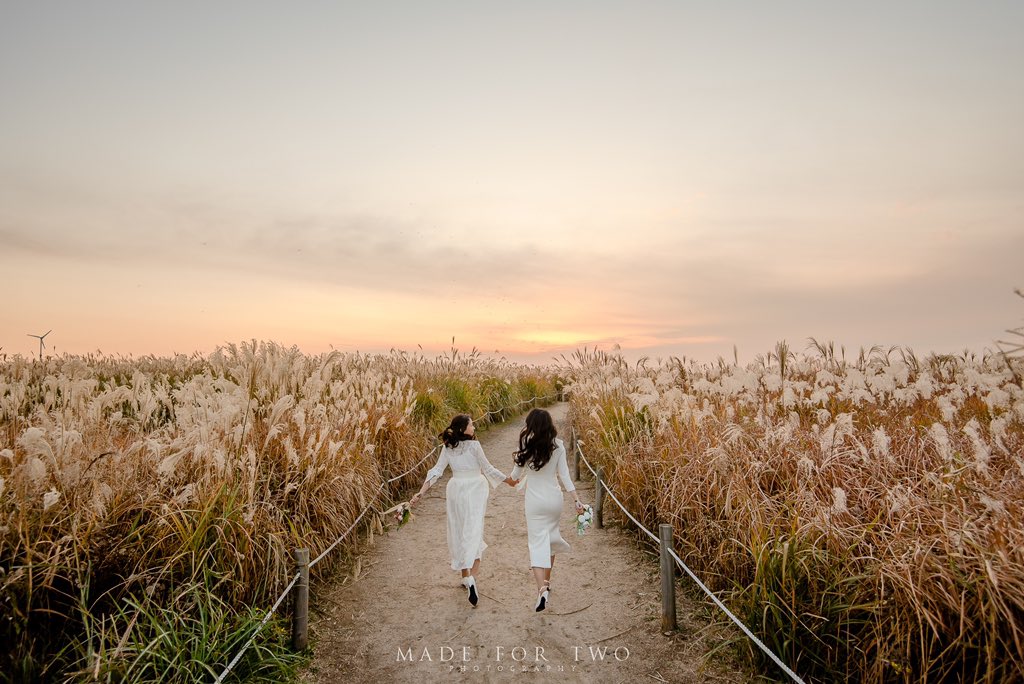
What exactly is your experience as a lesbian couple in Korea, a country known for its prejudice against minorities?
J: Well. People conclude that my lover is a man, of course. Like they question “Do you have a boyfriend?”. But I’m sure that this is not even just a Korean lesbian experience. It’s just a problem of heterocentric way of thinking. After meeting my wife, actually I never concealed being a lesbian to never go through such a situation.
D: I want to talk about sex. When we talk about lesbians, most men sometimes ask how women have sex with each other. It was the most rude of all my discrimination.
J: Also, since Korea does not yet have the concept of same-sex legal marriage, we cannot receive all the benefits that only [straight] couples can receive from the government. Tax breaks, rented houses or anything else.
Have you had any LGBTQ+ role models while growing up? How do you feel about becoming these role models to Korean LGBTQ+ youth?
J: Sadly I didn’t have it. As I grew up, I had to go through tremendous confusion and depression because of my gender identity. So my LGBTQ+ role model has always been my own, and as it will be, it’s actually very lonely. To prevent others from experiencing such confusion, I really want many people from their adolescence to feel – when they see my love, marriage and life with my woman of the same gender – that loving the same gender is also natural for themselves.
We were recently informed that there’s a growing resistance amongst conservative politicians towards the growing confidence and fight from minorities, specially the LGBTQ+ community. They’re trying to modify the Human Rights Act, right? Do you think there’s any chance that they can win this?
J: I think politics is a fight that many voices eventually win. More queers are raising their voices in Korea, and loud voices will eventually act as political power. We are fighting the law of denying our justification, and I think it’s very gradual but developing little by little.
In fact, several years ago, there was a first parliamentarian who asserted gay rights. It is very rare, but I thought that our human rights have made progress.
In Korea, most seniors (especially politicians) consciously ignore homosexuality. In particular, there is a strong tendency to think that it is just prematurity of legalizing same-sex marriage. But as you know, the biggest stumbling block to the old black human rights movement was not the terrorists full of anger at the blacks, but the whites with the power to claim that it is not yet [time to make progress]. The situation of homosexuals is fully consistent with that.
In particular, the legalization of same-sex marriage is difficult in Korea, not because of people’s perception, but because people who are able to issue legislation do not [think they] need to solve this problem.
When our marriage gets natural, not special, it will be the most valuable world for us. So don’t miss the hand of your choice until then!
– D
We would like to thank the couple’s dedication on this interview
and their courage to share their experiences with us.
Interview by Bea | K4US Editors Team
www.k4us.com.br | Please do not remove without credits.
 Português
Português English
English 한국어
한국어